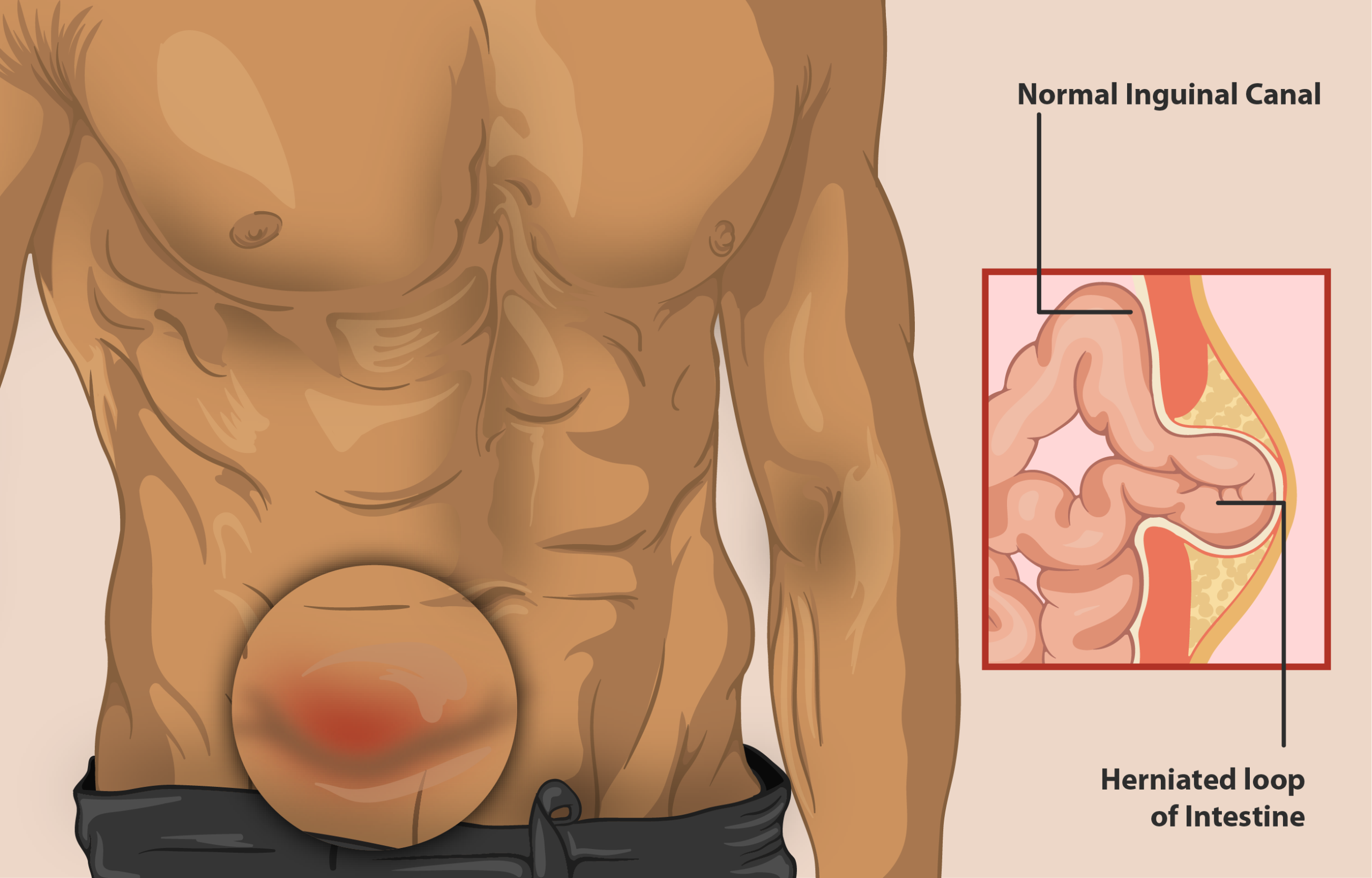What is a Hernia?
Hernia is a Latin word meaning “hole.”
It occurs when an organ or tissue in the body protrudes through a weak or hole-like area, deviating from its normal position. This condition generally occurs around the abdomen or groin area.
There are different types of hernias, some of which are notable:
- Inguinal Hernia:
- More common in men than women.
- It occurs when the intestines or fat protrude through the inguinal canal.
- Umbilical Hernia:
- Found in children when intestines or fat come out around the navel.
- Femoral Hernia:
- Usually seen in the upper part of the thigh.
- Often occurs in pregnant women or individuals with obesity due to their wider pelvic region.
- Hiatal Hernia:
- A small hole called the hiatus in the diaphragm connects the esophagus to the stomach.
- In this type, the upper part of the stomach moves up into the chest through the hiatus.
- Epigastric Hernia:
- These are typically small and can occur in multiple places.
- Small holes in the abdominal muscles allow fat or intestinal parts to protrude.
- Ventral/Incisional Hernia:
- Usually, it occurs in a weakened area after surgery.
- Organs or tissues protrude through the weak spots in the abdomen.
Symptoms of Hernia
Sometimes, hernias may not show any symptoms and can only be detected through medical examinations. However, some signs are worth noting:
- Swelling and pain in the part of the abdomen where the hernia is located.
- Pain when pressing the swollen area.
- Discomfort in the left side of the abdomen, under the ribs.
- Nausea or vomiting.
- Loss of appetite.
- In children, they are crying is due to pain or discomfort, especially after eating or physical exertion.
Causes of Hernia
- Hereditary factors or a family history of hernia.
- Excess body weight.
- Lifting heavy objects without stabilising abdominal muscles.
- Smoking.
- Chronic or excessive coughing.
- Prolonged diarrhoea or constipation.
How is a hernia diagnosed?
Hernias can typically be diagnosed through a physical examination. Doctors identify the condition by examining the painful and swollen area. If the diagnosis is unclear, imaging tests such as abdominal ultrasound, CT scan, or MRI are performed.
Why is Hernia Surgery Necessary?
Hernias do not heal on their own, and surgery is the only way to get rid of them. Many people believe that medication can fix hernias, but delaying or avoiding surgery can lead to severe complications. Surgery restores the displaced organ or tissue to its original position, tightening and strengthening the surrounding muscles and tissues.
If not treated, hernias can grow larger and cause problems. In the worst-case scenario, a part of the intestine may become trapped in the weakened area of the abdomen. This can cause severe pain, discomfort, and difficulty in bowel movements. Blood flow to the trapped intestine may stop, leading to tissue death. Immediate surgery is required to address this serious condition.
Types of Hernia Surgery
Hernia surgery is performed in two ways:
- Open Repair (Incision Surgery):
- In this method, the skin and abdominal covering are cut. The hernia hole is identified, and the displaced organ is repositioned inside. The hole is then stitched closed with thread. A mesh or artificial net is placed at the site of the hernia. This procedure uses general or regional anaesthesia.
- Endo-Laparoscopic Repair (Minimally Invasive Surgery):
- Instead of a large incision, small holes are made. A camera is inserted through one hole, and fine instruments are used through the others. The hernia hole is identified and repaired with sutures. A mesh is placed to strengthen the weak spot in the muscles.
- This surgery can be performed inside the abdomen or behind the abdominal muscles. General anaesthesia is used, and recovery is quicker compared to open repair.
HealthPlan BD Hernia Surgery Package: Best Service at the Lowest Cost
The HealthPlan BD Hernia Surgery Package offers comprehensive services, covering all necessary treatments and care for hernia surgery. This package aims to provide affordable healthcare without hidden costs.
Services included in the package:
- Top-quality medical care.
- Safe and secure environment.
- Pre-operative tests.
- Affordable surgery and related services.
- Post-operative care.
- Hospital stay.
- Supply of necessary medications (reputed brands).
- Consultation and guidance.
Package Options:
| Package | Ward/Cabin | Stay Duration | Medicineon Supply | Cost | AC |
|---|---|---|---|---|---|
| Package-1 | General Ward | 3 days | 3 days | 19,000/- | ✔ |
| Package-2 | Single Cabin | 3 days | 3 days | 23,000/- | ✔ |
| Package-3 | Double Cabin | 3 days | 3 days | 26,000/- | ✔ |
Why Choose HealthPlan BD for Surgery Packages?
- Affordable and skilled surgeons.
- Complete support from start to finish.
- Transparent pricing with no hidden costs.
- Advanced technology and equipment.
- Post-surgery care and rehabilitation.
- Digital medical records for easy access.
- Convenient appointment booking and follow-ups.
- 24/7 customer support.
- Consultation and guidance before and after surgery.
- Insurance assistance for seamless coverage.
FAQ:
Q: What are the symptoms of hernia?
A: Symptoms include swelling, pain in the affected area, nausea, vomiting, and loss of appetite.
Q: Is surgery necessary for hernia?
A: Yes, surgery is the only permanent solution. The necessity depends on the type, size, and symptoms of the hernia.


